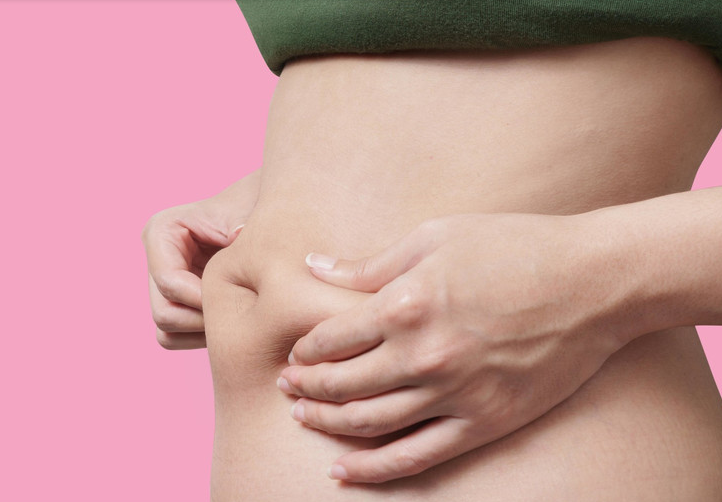
Hormonal belly: why it grows and how to get rid of it
0
A thin waist is synonymous with slimness and youth, but what to do if the volume of the stomach does not want to decrease? What is the cause of the “hormonal belly” and how to deal with it?
Excess waist volume can seriously distort the proportions of a woman's figure, and is often a direct result of health problems. In other words, until you deal with them, no diet and exercise will help. Together with an endocrinologist and a nutritionist, we offer to understand the most common hormonal disorders that “gift” women with excess fat in this area.
Let's start with the fact that a small fold on the stomach is an absolute norm for women, unless, of course, you are a fitness model before a competition. In this case, completely different laws come into play, and, by the way, there is no need to talk about health and hormonal balance here either. Adipose tissue in the body is vital: it performs many important functions, in particular, it participates in the synthesis of sex hormones. At the same time, obesity is the main factor in the development of polycystic ovary syndrome and, as a result, infertility, cardiovascular pathologies, diabetes mellitus, and a number of cancers.
But back to the belly. There are three hormones, the increased levels of which manifest themselves in the form of excess fat in the waist area: cortisol, insulin and prolactin. It is quite possible that you have even heard the term “cortisol belly”.

Cortisol
Cortisol is a stress hormone, under the influence of which the body begins to actively store fat cells. At the same time, insulin resistance is formed, the so-called insulin resistance, which affects eating habits (cravings for sweet and fatty foods, voracious appetite, “just ate, and then I'm hungry again”) and practically blocks the process of losing weight.
It is important to note that cortisol is produced by the adrenal glands, which respond to stress with a powerful release of the hormone. At the same time, stress for them is not only exciting short-term events – on the contrary, nature intended that with the help of hormonal resources we safely experience various life situations. Permanent stress, which we often do not consider as such, is much more dangerous for our adrenal glands.
It can be caused by non-compliance with the daily routine with going to bed well after midnight, the constant presence of gadgets, lack of sleep and early morning awakenings with liters of coffee, an improper diet with an excess of fast carbohydrates, a sedentary lifestyle. In general, everything that has long become the norm of life for a modern person.
Insulin
It is also easy to get into a vicious circle with insulin: overeating, low mobility, and improper nutrition lead to weight gain and insulin resistance, that is, a state when insulin is not perceived by tissue cells. As a result, a hormonal failure occurs in the body, an “insulin belly” appears (abdominal obesity is diagnosed when the waist circumference in women is > 80 cm and > 90 cm in men), and a high concentration of insulin in the blood blocks further fat breakdown.

Prolactin
Another insidious hormone is prolactin, which slows down metabolism and increases appetite. As a result, in this case, we also gain weight, often in the abdomen, chest and back. To reduce it, you need to reduce prolactin, but at the same time, prolactin concentration often magically decreases if you normalize your weight.
How to deal with a hormonal belly?
It is not possible to lose weight and remove the belly – what to do? First of all, experts recommend taking tests for hormones, and not only for those mentioned above, but also for thyroid hormones, the concentration of “bad” and “good” cholesterol, the level of some vitamins and trace elements of the same vitamin D.
After passing the tests from the developed clinical minimum, you can not waste time on experiments and immediately start working with the cause of excess weight. These are individual appointments, but there are also general recommendations: go to bed no later than 23, get up at 6-7 in the morning, have a normal breakfast (proteins, fats and slow carbohydrates, not coffee with a bun). Eat three times a day, excluding “food waste”, such as sweets, products with dyes, sweeteners, preservatives.
It is recommended to exclude snacks that contribute to an increase in blood sugar levels and constant maintenance of it at a high level. Reduce the amount of calories consumed by 20% (no “600 calories per day”). Think about taking adaptogens – ashwagandha, vitamin C, cordyceps, shiitake, Chinese lemongrass, rhodiola rosea, etc.
Also, do not forget about doing moderate sports. Daily walks of 4-5 thousand steps will also be suitable. Monitor your mood stability, try to identify sources of stress and get rid of them, up to changing jobs and eliminating toxic people from your environment.









Leave a Reply